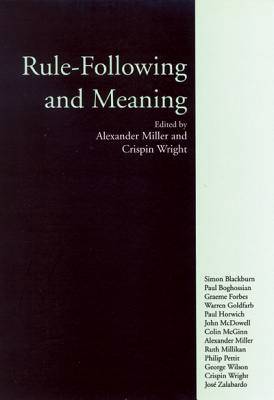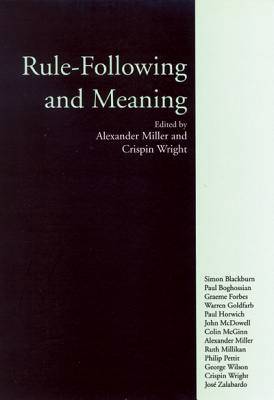
- Retrait gratuit dans votre magasin Club
- 7.000.000 titres dans notre catalogue
- Payer en toute sécurité
- Toujours un magasin près de chez vous
- Retrait gratuit dans votre magasin Club
- 7.000.0000 titres dans notre catalogue
- Payer en toute sécurité
- Toujours un magasin près de chez vous
186,95 €
+ 373 points
Format
Description
The rule-following debate, in its concern with the metaphysics and epistemology of linguistic meaning and mental content, goes to the heart of the most fundamental questions of contemporary philosophy of mind and language. This volume gathers together the most important contributions to the topic, including papers by Simon Blackburn, Paul Boghossian, Graeme Forbes, Warren Goldfarb, Paul Horwich, John McDowell, Colin McGinn, Ruth Millikan, Philip Pettit, George Wilson, and José Zalabardo. This debate has centred on Saul Kripke's reading of the rule-following sections in Wittgenstein and his consequent posing of a sceptical paradox that threatens our every day notions of linguistic meaning and mental content. These essays are attempts to respond to this challenge and represent some of the most important work in contemporary theory of meaning. They examine the notion of meaning; whether it is possible to find a suitable meaning-constituting fact from our previous behaviour or mental histories; objections to, and defenses of, dispositional accounts of meaning; the plausibility of non-factualism about meaning; our attempts to develop non-reductionist accounts of meaning; and the sources of the normativity which attaches to meaning, such as the linguistic practice of the community or the dispositions of the individual. With an introductory essay and a comprehensive guide to further reading the book is an excellent resource for courses in philosophy of mind, philosophy of language, Wittgenstein, and metaphysics, as well as for all philosophers, linguists, and cognitive scientists with interests in these areas. Contributors include Simon Blackburn (University of Cambridge), Paul Boghossian (New York University), Graeme Forbes (Tulane University), Warren Goldfarb (Harvard University), Paul Horwich (City University of New York), John McDowell (University of Pittsburgh), Colin McGinn (Rutgers University), Alexander Miller, Ruth Garrett Millikan (University of Connecticut), Philip Pettit (Princeton University), George. M. Wilson (University of California, Davis), Crispin Wright, and José L. Zalabardo (University College London).
Spécifications
Parties prenantes
- Auteur(s) :
- Editeur:
Contenu
- Nombre de pages :
- 230
- Langue:
- Anglais
Caractéristiques
- EAN:
- 9780773523814
- Date de parution :
- 08-04-02
- Format:
- Livre relié
- Format numérique:
- Genaaid
- Poids :
- 569 g

Les avis
Nous publions uniquement les avis qui respectent les conditions requises. Consultez nos conditions pour les avis.






